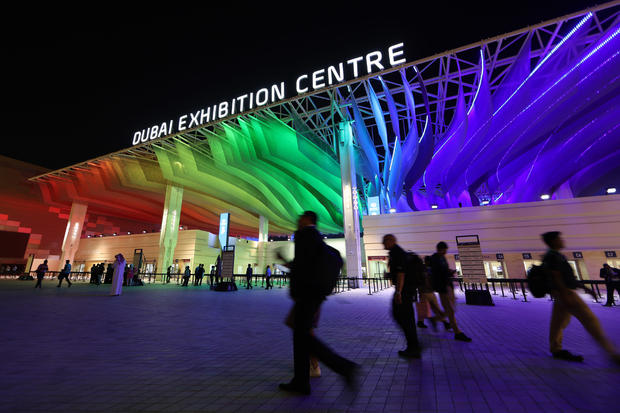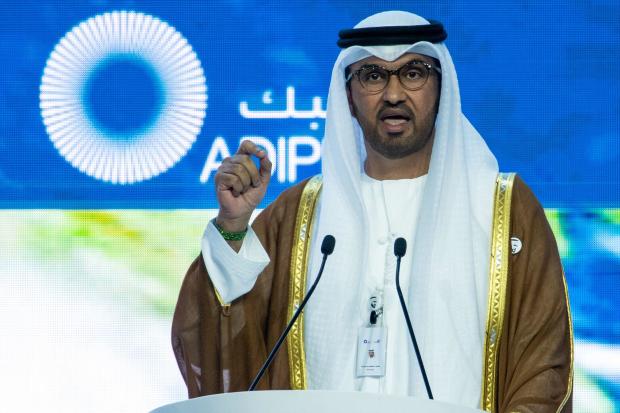What to know about the COP28 climate summit: Who's going, who's not, and will it make a difference for the planet?
The annual United Nations climate talks get underway this week. The conference, known as COP28, brings together thousands of leaders from around the world, including top government and business officials, scientists and activists.
Here is what to know about the gathering and the chances for progress in the face of the growing threat posed by climate change.
What is COP28?
COP stands for "Conference of the Parties," referring to signatories of the U.N. Framework Convention on Climate Change — an agreement signed by over 150 governments in 1992.
COP28 is the 28th annual summit bringing their representatives together to seek agreement on goals and strategies to address the climate crisis.
When and where is COP28 being held?
COP28 officially begins Thursday, Nov. 30, and runs through Dec. 12, 2023.
The COP28 summit is being held in Dubai, United Arab Emirates. (Hosting duties for the annual summits rotate between different continents and major regions around the world.)

Who is attending COP28?
About 70,000 participants are expected, including various heads of state, climate envoys, business leaders, lobbyists, Indigenous groups, activists, protesters and others.
Pope Francis was planning to go but had to cancel for health reasons as he recovers from influenza, the Vatican said Tuesday. King Charles will be there and plans to speak.
President Biden spoke at COP27 last year but is not planning to attend COP28 this year. U.S. climate envoy John Kerry will lead the U.S. delegation. Chinese President Xi Jinping is also not expected to attend, but India's Prime Minister Narendra Modi will be there. China, the U.S., and India are the world's top three emitters of planet-warming greenhouse gases.
Climate change priorities and challenges
The annual talks come as climate scientists warn the planet is increasingly flirting with climate disaster and approaching or reaching "tipping points" for irreversible harm as ice melts, sea levels rise and more extreme conditions fuel drought, wildfires and floods. 2023 is expected to be the planet's warmest year on record.
Progress by countries to cut their planet-warming emissions has been very slow and inadequate, failing to reach the goals they set in the 2015 Paris Climate Agreement. A report released last week by the U.N. warned that, under current policies, warming could reach 3 degrees Celsius above the pre-industrial average by the end of the century — a level that would devastate the global population.
At COP28, diplomats from nearly 200 countries will attempt to agree to a plan to accelerate the transition away from fossil fuels. The big debate is whether a final agreement will call for a "phase out" of fossil fuels or use weaker language of a "phase down." Whatever final agreement is reached will come at the very end of the conference.
U.S. makes progress but still falls short
Annual U.S. greenhouse gas emissions fell 12% between 2005 and 2019, largely driven by a 40% drop in emissions from the electricity sector due to declining coal use. The Inflation Reduction Act provides hundreds of billions of dollars to supercharge renewable energy deployment and electric vehicle manufacturing. Despite this, the U.S. is still not on track to meet the Biden administration's goal of cutting emissions by 50% from 2005 levels by 2030.
Also, new data from the U.S. Energy Information Administration, which tracks daily domestic crude oil production, shows that the U.S. in recent weeks produced 13.2 million barrels of crude oil per day — the most crude oil the nation has ever produced. This production level has also drawn criticism from the left, as the Biden administration was outpacing the Trump administration for the number of leases for oil and oil and gas drilling on public lands.
Another recent report, from the group Oil Change International, found that the U.S. accounts for more than a third of the world's expansion in oil and gas production planned through 2050. It dubbed the country "Planet Wrecker in Chief."
Expectations for COP28
Expectations are low, given general inaction on cutting emissions and China signaling it won't agree to a "phaseout of fossil fuels." However, the U.S. and China — the world's two top polluters — have recently reengaged on climate, saying they will push to "pursue efforts to triple renewable energy capacity globally by 2030" to accelerate the substitution of coal, oil and gas.
One expected outcome of the summit is the first "global stocktake," which is the first assessment since the Paris Climate Accord in 2015 of how nations are doing in efforts to keep global temperature rise below 1.5 degrees Celsius (2.7 degrees Fahrenheit). Spoiler alert: Not doing well, as warming has already reached 1.2 degrees C, and global emissions are still rising. The stocktake could recommend ambitious action to more quickly curb emissions.
There is also hope for reaching an agreement to cut emissions of methane, a potent greenhouse gas that has over 80 times the warming power of carbon dioxide during its first 20 years in the atmosphere.
Every country has to agree to every word of the final document produced at the summit, so making substantial progress has proven difficult in the past and led some critics to view these annual events as a waste of time. Furthermore, any agreements reached are not binding, which is also why critics accuse world leaders of making empty promises that have often gone unfulfilled.
Controversy surrounding host nation UAE
The talks are being held in the United Arab Emirates, which is world's fifth largest oil producer. The president of this year's COP is Sultan Ahmed al-Jaber, who is also the head of UAE's state-owned oil company as well as its renewable energy company. Climate activists say it's like letting the fox into the hen house.
CBS News partner BBC News obtained leaked briefing documents showing that al-Jaber planned to discuss oil and gas commercial interests during meetings with foreign officials in the leadup to the climate conference.

Michael Jacobs, a professor at England's Sheffield University who focuses on U.N. climate politics, said it looked "breathtakingly hypocritical."
"I actually think it's worse than that, because the UAE at the moment is the custodian of a United Nations process aimed at reducing global emissions," he told the BBC. "And yet, in the very same meetings where it's apparently trying to pursue that goal, it's actually trying to do side deals which will increase global emissions."
-Bo Erickson and Haley Ott contributed reporting.
- In:
- United Arab Emirates
- Climate Change
- United Nations
- Dubai

Ben Tracy is a CBS News senior national and environmental correspondent based in Los Angeles.
TwitterDisclaimer: The copyright of this article belongs to the original author. Reposting this article is solely for the purpose of information dissemination and does not constitute any investment advice. If there is any infringement, please contact us immediately. We will make corrections or deletions as necessary. Thank you.
Title:What to know about the COP28 climate summit: Who's going, who's not, and will it make a difference for the planet?
Url:https://www.investsfocus.com







